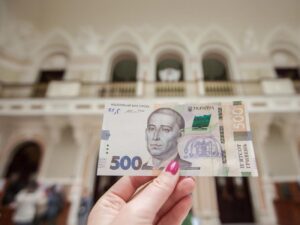
As of October 5, sugar production in Ukraine amounted to 240,200 tonnes, and in general, 1.89 million tonnes of sugar beet were processed, according to a report on the website of the National Association of Sugar Producers Ukrtsukor.
Thus, to date, sugar beet is being processed by 25 out of 33 refineries that have planned to produce sugar in the current marketing year (September-August).
According to the data on the website of the Ministry of Agrarian Policy and Food, as of October 4, Ukrainian farmers harvested 2.26 million tonnes of sugar beet (20.8% of the forecast) with a yield of 47.96 tonnes per ha.
As reported, the current season of sugar beet processing in the country started on August 21.

France could potentially provide another EUR 1 billion in investment in the Big Construction program, Ukrainian Infrastructure Minister Oleksandr Kubrakov wrote on his Facebook page on Tuesday evening. “In 2021, Ukraine and France signed a Framework Agreement with a total value of EUR 1.3 billion. The new directions that we presented recently will potentially add another billion in investments,” the minister said.
According to him, the Big Construction program of President Volodymyr Zelensky this year gave the first noticeable results, which attracted the attention of the French government and French companies to Ukraine.
He recalled that in the summer the Ministry of Infrastructure began cooperation with France’s Aerogestion on the optimal model for creating a national air carrier, and by the end of this year it is planned to present the results and possible solutions to the government.
“As part of the development of the concept of the national air carrier, we are also exploring opportunities for cooperation between Antonov State Enterprise and AirBus in cargo transportation and provision of firefighting aircraft. These are ambitious and difficult projects that are inspired by the idea of Greater Europe, because the European Union itself began not only from coal and steel, but also from the first European aircraft,” Kubrakov said.
In addition, Kubrakov said that a project for the construction of a new road on the Krakovets-Lviv-Brody-Rivne route was presented in Paris, to which a company with a private initiative has already joined.
“By the end of the year, the development of a feasibility study will be completed, and next year we expect a competition and the launch of the project. The expertise and experience of French road companies in such projects are extremely valuable,” the minister of infrastructure of Ukraine said.
According to him, cooperation between the two countries will also influence the Ukrainian railway – now the contract between Ukrzaliznytsia and France’s Alstom for the purchase of locomotives is being finalized.
As reported, earlier, in the presence of Zelensky, an agreement on the provision of 130 new Alstom freight electric trains produced by France to Ukrzaliznytsia was signed.

Revenue of Metinvest B.V. (the Netherlands), the parent company of the Metinvest mining and metallurgical group, in July this year increased by 1.6%, or $27 million compared to the previous month, to $1.749 billion from $1.722 billion.
According to the published preliminary unaudited consolidated monthly results of the company’s financial statements on Tuesday, the total EBITDA for July was $963 million, which is $32 million, or 3.4% more than in June ($931 million). At the same time, EBITDA from participation in the joint venture amounted to $173 million (in June – $126 million).
According to the report, the adjusted EBITDA of the group’s metallurgical division over July 2021 amounted to “plus” $420 million (in June – “plus” $401 million), including $51 million from participation in the joint venture ($28 million); EBITDA of the mining division – $610 million ($650 million), including from the joint venture – $121 million ($97 million). The management company spent $10 million ($30 million).
Total revenue in July consisted of the $1.362 billion revenue in the metallurgical division ($1.303 billion in June), and the $690 million revenue in the mining division ($713 million). Intragroup sales were $303 million ($294 million).
The total debt of Metinvest in July decreased by $10 million compared to June, to $2.449 billion from $2.459 billion. At the same time, the cash volume increased by $631 million, to $2.074 billion from $1.443 billion.
Funds used in investment activities amounted to $314 million, and in financial activities – $22 million.
Metinvest received $70 million from the resale of square billets (produced by Dniprovsky Iron and Steel Work) in July in the amount of 94,000 tonnes. In addition, $254 million was received from the resale of 225,000 tonnes of flat-rolled products, 79,000 tonnes of long products – $67 million, and 53,000 tonnes of cast iron – $44 million.
In general, the company in July sold 370,000 tonnes of semi-finished products for $287 million, 809,000 tonnes of finished metal products for $913 million, and 186,000 tonnes of coke for $87 million.
In July, the group sold 1.437 million tonnes of iron ore for $366 million, and 82,000 tonnes of coal concentrate for $12 million.

Commander of the Naval Forces of the Armed Forces of Ukraine Oleksiy Neizhpapa at a meeting in Odesa with Defense Attaché at the Danish Embassy in Ukraine Felix Ebbestad discussed issues of military cooperation, primarily the possibility of building ships with the support of Denmark.
As the Navy of the Armed Forces of Ukraine said this on Facebook on Monday, the meeting separately considered the main development priorities, which provide for external support and the possibility of transferring equipment to Ukrainian crews to carry out tasks to combat the damage of ships within the material and technical assistance.
Neizhpapa spoke about modern maritime threats, the main achievements in the reform and development of the national fleet, taking into account the standards of the North Atlantic Alliance.
According to the attaché, Denmark is sympathetic to the challenges and threats to Ukraine and is ready to develop relations with the aim of helping our country to maintain security not only in the Azov-Black Sea region, but in the world as a whole.

The decrease in the share of non-performing loans (NPL) in the banking sector of Ukraine to 35% from 36.3% in August was facilitated by the correct regulatory policy of the National Bank and less risky new loans that banks are issuing now, the founder and partner of the group of companies, Andriy Volkov, commented on the statistics of the central bank for the specified month to the Interfax-Ukraine agency.
He considers the decline in the share of problem loans in the banking system to be a natural process for several reasons. First, the NBU introduced rather strict rules for the assessment and provisioning of the loan portfolio, after which the banks began fruitful work on restructuring NPLs, collecting them or selling them to specialized companies. Secondly, the country is gradually resuming lending – both retail and corporate. However, due to the filing of the banks’ risk management and NBU requirements, it is now less risky and produces much fewer non-performing loans. Accordingly, the portfolio of banks began to grow again, which means that the share of old problem debts began to decline.
According to Volkov’s forecasts, this trend will continue, and the share of non-performing loans will continue to decrease.
At the same time, he drew attention to where these troubled debts are concentrated.
“Commercial banks, for the most part, have resolved or are successfully solving issues with non-performing loans: they have restructured more or less “live” debts or debts associated with the shareholders and the bank management, collected collateral from non-performing loans, sold or are selling loans, with the collection of which they cannot cope independently. Therefore, the main volume of bad debts was concentrated in state banks. And this is the next point of development for the Ukrainian NPL market, in which changes must take place – the system of working with problem debts of state banks will change or, more realistically, the sale of bad debts will begin, because without this, neither development nor sale of state-owned banks is possible,” the financier believes.
In addition, according to him, solving problems with problem debts in state banks is also on the agenda of international creditors and donors of Ukraine. Therefore, the government as a shareholder, the NBU as a regulator, as well as the supervisory boards of state banks are forced to pay sufficient attention to them.

If the presidential elections in Ukraine were held in the near future, then 32% of Ukrainians who will definitely go to the elections and have decided on their choice, would vote for incumbent President Volodymyr Zelensky, according to results of the all-Ukrainian sociological survey “Socio-Political Moods of Ukrainians: September 2021”, held by the Ukrainian Institute of the Future together with the sociological company New Image Marketing Group.
Zelensky’s rating rose 2% from June, the Institute said in a press release on Facebook on Monday, October 4.
“That is, 32% of those who have made up their minds and will go to the polls are now ready to vote for him. While the ratings of his closest competitors Poroshenko and Boiko dropped by 2% and 1%, respectively. Both have 12% among those who have made up their minds and will go to the polls. The fourth place is consistently occupied by Yulia Tymoshenko – 11% among those who have made up their minds and will go to the polls. At the same time, the rating of Groisman and Muraev increased to 7% among those who decided to go to the polls,” the release says.
It clarifies that young people under 24 years of age support Zelensky the most – 39% of respondents.
“Even in the East, Zelensky is ahead of Boiko – 27% to 16% respectively. Nevertheless, Donbas remains an openly problematic region for Zelensky – there he loses to Boiko unquestioningly – 16% to 29%.
Relatively little support in Donetsk and Luhansk regions correlates with low confidence in the incumbent head of state there and a greater proportion of those who support early presidential elections,” the release says.
In addition, if the elections to the Verkhovna Rada were held next Sunday, then 23% of those polled would vote for the Servant of the People party. The Opposition Platform is on the second and third place in terms of electoral preferences of 16% of citizens who decided to go to the polls, and the European Solidarity party – for 15% of those who decided to go to the polls.
Just like in the presidential rating, Yulia Tymoshenko’s Batkivschyna party ranks fourth – 14% among those who have made up their minds and will go to the polls. Ihor Smeshko’s “Strength and Honor” received fewer votes – 7% among those who decided to go to the polls.
“The Ukrainian Strategy of Groisman party and Yevhen Muraev’s Nashi Party did not overcome the 5% barrier in absolute terms, having received 4% each among those who decided to go to the elections. Also the party of Anatoliy Shariy and the party of Prytula got 3% each among those who decided to go to the polls. And the Holos party got 2% among those who decided to go to the polls,” the Institute reports.
They clarify that in comparison with the sentiments of respondents regarding participation in the presidential elections, the share of those wishing to vote for MPs is slightly lower – 70% declare their desire to vote in the parliamentary elections. However, 25% will not go to the parliamentary elections and will not vote. And another 5% of citizens were undecided.
All-Ukrainian sociological research “Socio-political moods of Ukrainians: September 2021” was conducted by the Ukrainian Institute of the Future together with the sociological company New Image Marketing Group among 2,400 respondents throughout Ukraine from September 18 to September 28, 2021. The margin of error is no more than 2%.